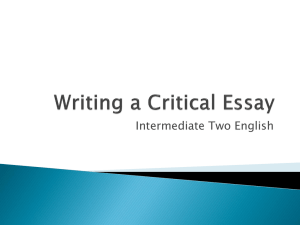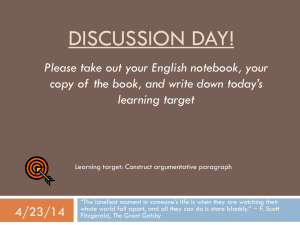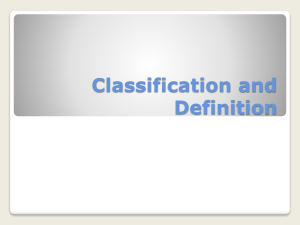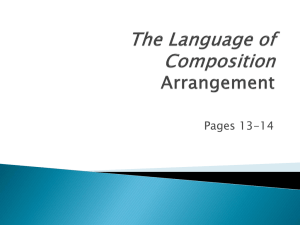Thinking Maps Templates
advertisement
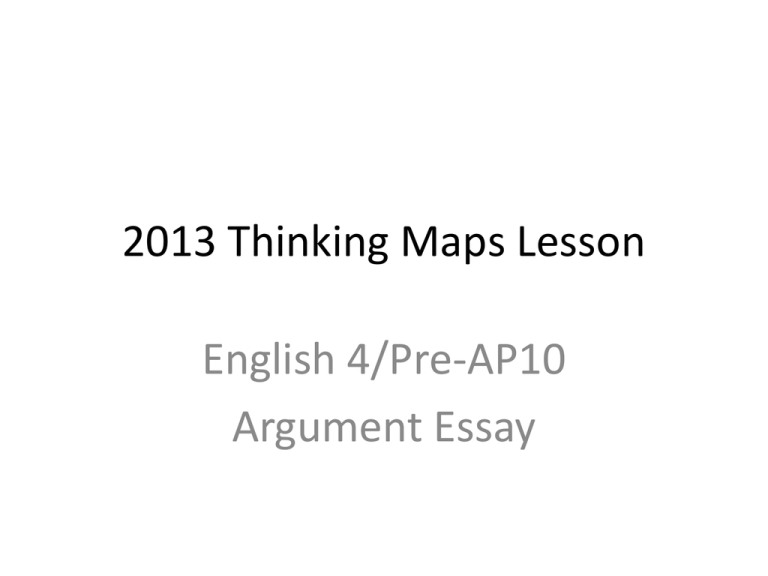
2013 Thinking Maps Lesson English 4/Pre-AP10 Argument Essay Essay Timeline Day 1: Circle Map (brainstorm ideas) Day 2: Flee Map (organize ideas) Essay Body Rough Draft Day 3: Brace Map (intro & conclusion) Day 4: Tree Map (sentence fluency) Bridge Map (word choice) Day 5: Final Draft – in class only Circle Map Circle Map source idea/quote source idea/quote idea/quote Essay Topic source idea/quote source idea/quote source idea/quote source idea/quote source Circle Map HOW do you know what you know – personal experience, research data, expert testimony, etc.? source WHAT does this map reveal? What conclusions can you draw from the information here? source idea/quote idea/quote idea/quote Essay Topic source idea/quote source idea/quote source idea/quote source idea/quote source WHY is this information important? Flee Map Flee Map Essay Topic & Stance Paragraph 1 Topic Paragraph 2 Topic Paragraph 3 Topic Flee Map Essay Topic & Stance Paragraph 1 Topic Paragraph 2 Topic Paragraph 3 Topic Supporting details, elaborations, direct quotes, paraphrases, emotional & logical appeals, etc. Flee Map WHAT do these particular details reveal about the topic? HOW do details support or prove your stance? Essay Topic & Stance Paragraph 1 Topic Paragraph 2 Topic Paragraph 3 Topic Supporting details, elaborations, direct quotes, paraphrases, emotional & logical appeals, etc. WHY are these details particularly important to note in your essay? Ethos – Pathos - Logos Ethos – ethical appeal – Prove your credibility by using academic voice, strong vocabulary, correct grammar Pathos – emotional appeal – Appeal to emotions by using connotations and emotional stories and examples Logos – logical appeal – Convince audience by using logic or reason – Cite facts, statistics, & authorities – Use historical and literal analogies – Construct logical arguments Brace Map Hook Introduction Background Topic Thesis Stance Focus/STs Brace Map HOW will this “hook” engage my reader? Hook Introduction Background Topic Thesis WHY is this background information important? Stance Focus/STs WHAT does this thesis tell my reader about the essay to follow? Brace Map Restate topic & stance 1 sentence re. Paragraph 1 topic Conclusion 1 sentence re. Paragraph 2 topic 1 sentence re. Paragraph 3 topic Logical conclusion to discussion Brace Map WHY is it important to close with these particular points? Restate topic & stance 1 sentence re. Paragraph 1 topic Conclusion 1 sentence re. Paragraph 2 topic 1 sentence re. Paragraph 3 topic HOW does this conclusion create a sense of closure for my reader? Logical conclusion to discussion WHAT emotion will this closing likely evoke in my reader? Tree Map Body Paragraph ___ Fluency Simple Sentences Compound Sentences Complex Sentences Write sentences on these lines. Then combine and separate to balance the lists and increase fluency. Tree Map WHAT types of structures do you use the most in this essay? HOW do these structures affect the essay’s flow or fluency? Body Paragraph ___ Fluency Simple Sentences Compound Sentences Complex Sentences Write sentences on these lines. Then combine and separate to balance the lists and increase fluency. WHY is it important, in terms of your ethical appeal (i.e., credibility as an author), to revise the sentences in this particular paragraph? Bridge Map is a more effective word choice than New word Original word as New word Original word as New word Original word New word as Original word as New word Original word Bridge Map WHAT types of word choice issues did you find in your essay – ambiguity, clichés, informality, repetition, incorrect terms? is a more effective word choice than New word Original word as New word Original word HOW do your original word choices affect the essay’s tone, mood, and/or effectiveness? How will your substitutions affect these elements? as New word Original word New word as Original word as New word Original word WHY is it important, in terms of your ethical appeal (i.e., credibility as an author), to make these substitutions?


